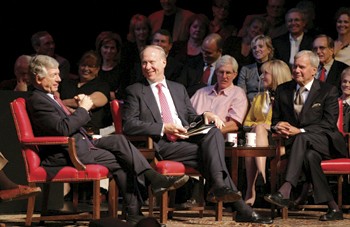
Ted Koppel, David Gergen and Tom Brokaw (from L to R) talk onstage at McFarlin Auditorium during this year’s first Tate Lecture.
The 25th year of the Tate Lecture Series began with a sobering assessment from lecturers Tom Brokaw and Ted Koppel of what challenges the United States faces internationally. The two newsmen along with moderator David Gergen provided in-depth analysis of the current situation in Iraq, the state of the war on terrorism and what could happen in Iran.
“We’re not winning the war on terrorism … it’s larger and more complex than we thought it would be,” former NBC anchor Brokaw said. “And I don’t think it can be solved militarily.”
Brokaw said the missing piece no one has come up with is the underlying cause of the terrorism. He says that is key to winning the battle.
Koppel pointed out that the Bush administration has been unwilling to ask the American public to sacrifice anything – a point both he and Koppel came back to several times over the course of the evening.
“You can’t fight ‘the long war’ without involving everyone,” Koppel said.
Koppel also said the Bush administration has turned Osama Bin Laden into a “superstar” and al-Qaeda into the “best known brand since McDonalds.”
“We are not safer since 9/11. The world is a more dangerous place,” he said.
Both journalists agreed that the situation in Iraq is at a tipping point.
Brokaw said he visited the country shortly before the invasion and visited a university on its graduation day. He described the young students as smart and interested to learn about American culture – but their responses when he asked what they wanted to do after graduation caught him off guard.
“They all said they wanted to do jihad against the United States if they were invaded…I was surprised by that,” Brokaw said.
Koppel said that he is not convinced the U.S. had to “go ballistic” in Iraq, and discussed the reasoning for going to war.
“Did Osama Bin Laden relate with Saddam Hussein? No. Did Saddam have weapons of mass destruction? No,” Koppel said. “I was among those who thought he did, but he didn’t.”
Both men agreed that raising troop levels seemed to be the only realistic possibility for the immediate future.
Koppel recently traveled to Iran and after visiting said he was convinced the Iranians were going to work toward a nuclear bomb – and that the U.S. can’t do much about it.
He mentioned that 70 percent of the population is under the age of 30, but people are unwilling to overthrow the fundamentalist governement.
“The young people there are very resentful of the lives they have, but we don’t do a good job of giving them hope,” Brokaw said.
Brokaw also visited the country recently and said the desire for nuclear technology is one thing all Iranians agree on.
Before the lecture started, a short video played narrated by Colin Powell. It detailed the history of the Tate series and explained where the money generated is applied. Nearly $1 million is raised annually, the majority of which is funneled to the Presidential Scholar program.








